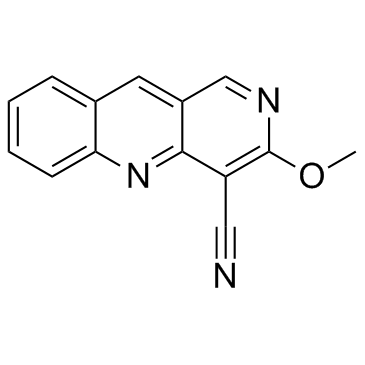| Description |
CCB02 is a selective CPAP-tubulin interaction inhibitor, binding to tubulin and competing for the CPAP binding site of β-tubulin, with an IC50 of 689 nM, and shows potent anti-tumor activity. CCB02 shows no inhibition on the cell cycle- and centrosome-related kinases, or the phosphorylation status of Aurora A, Plk1, Plk2, CDK2, and CHK1[1].
|
| Related Catalog |
|
| Target |
IC50: 689 nM (CPAP-tubulin)[1]
|
| In Vitro |
CCB02 is a selective CPAP-tubulin interaction inhibitor, binding to tubulin and competing for the CPAP binding site of β-tubulin, with an IC50 of 689 nM. CCB02 perturbs CPAP PN2-3-tubulin interaction with an IC50 of 0.441 μM in a PN2-3 CPAP-GST pull-down assay[1]. CCB02 shows no inhibition on the cell cycle- and centrosome-related kinases, or the phosphorylation status of Aurora A, Plk1, Plk2, CDK2, and CHK1[1]. CCB02 inhibits the proliferation of cancer cells with extra centrosomes, IC50s are 0.86-2.9 μM. CCB02 activates spindle assembly checkpoint, induces PCM proteins recruitment to centrosomes, and enhances microtubule nucleation activities of centrosomes[1].
|
| In Vivo |
CCB02 (30 mg/kg, p.o. daily) shows potent anti-tumor effect in nude mice bearing subcutaneous human lung (H1975T790M cells) tumor xenografts. CCB02 also suppresses MDA-MB-231 cell migration and cuases multipolar mitosis in mouse xenografts[1].
|
| References |
[1]. Mariappan A, et al. Inhibition of CPAP-tubulin interaction prevents proliferation of centrosome-amplified cancer cells. EMBO J. 2019 Jan 15;38(2). pii: e99876.
|
